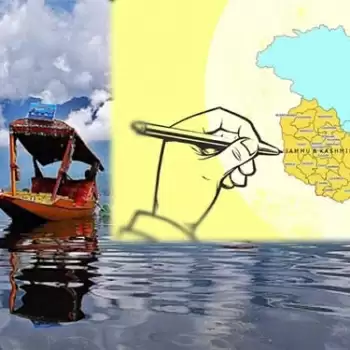By : Shashank Suresh
The development of the democratic process in Jammu and Kashmir was overwhelmingly supported at a high-profile all-party meeting hosted by Prime Minister Narendra Modi and attended by 14 key figures. This was the first high-level meeting between the Centre and the political leadership of Jammu and Kashmir after the state’s special status was removed and the state was divided into two union territories on August 5, 2019.
Prime Minister Narendra Modi announced on Independence Day last year that elections will be conducted in J&K when the Union Territory’s delimitation process was completed. Delimitation is critical for the political process in J&K to get off the ground.
Elections in J&K have been scheduled since the BJP-PDP coalition fell apart in June 2018, following which the state was placed under the governor’s control. The Modi government has repeatedly stated that elections in Jammu and Kashmir will be held after the delimitation exercise is completed, despite the abrogation of Article 370 and the bifurcation of the erstwhile state into the union territories of Jammu & Kashmir, which will have an elected legislature, and Ladakh, which will not.
What is Delimitation?
The process of demarcating the boundaries of parliamentary or assembly seats is known as Delimitation. This process is overseen by a Delimitation Commission, whose decisions are binding and cannot be challenged in court. The goal is to redraw borders (based on the most recent Census data) in such a manner that the population of all seats is as uniform as possible throughout the state.
The procedure may result in a change in the number of seats in a state, in addition to modifying the boundaries of a constituency. Because of the political sensitivity of the exercise, no administration, federal or state, may conduct it, thus Parliament enacts a Delimitation Act under Article 82 of the Constitution following each Census.
The commission is made up of a chairman a retired or serving Supreme Court judge, the chief election commissioner or one of the two election commissioners, and the election commissioner of the state where the election is taking place. In addition, associate members of the commission are chosen from among the state’s five MPs and MLAs.
The commission relies on EC workers to carry out the lengthy procedure because it is a transitory body with no full-time staff. Census data is collected for each district, tehsil, and gram panchayat, and new borders are drawn. It might take up to five years to complete the task.
How often has delimitation been carried out in J&K?
Because of the region’s unique status, which was abolished by the Centre in August 2019, delimitation exercises in J&K have been slightly different from those in the rest of the nation in the past. Until then, the Constitution of India regulated the delimitation of Lok Sabha seats in J&K, while the Jammu and Kashmir Constitution and the Jammu and Kashmir Representation of the People Act, 1957 governed the delimitation of state Assembly seats.
In 1963, 1973, and 1995, assembly seats in J&K were delimited. When the state was under President’s Rule, the final exercise was performed by the Justice (retired) K.K Gupta Commission, and it was based on the 1981 census, which served as the foundation for the state elections in 1996. In 1991, the state government did not conduct a census, and following the 2001 census, the state administration did not establish a Delimitation Commission since the J&K Assembly enacted legislation prohibiting new seat delimitation until 2026. The Supreme Court upheld the moratorium.
Why is delimitation so controversial in J&K?
Because it is closely connected to the representation of Muslim-dominated Kashmir and Hindu-dominated Jammu in the legislative assembly, the delimitation of J&K is a politically sensitive topic. The BJP and other political parties demanding more representation for Jammu in the Assembly have contended that the 2002 freeze has resulted in inferior representation for Jammu.
While the J&K Assembly had 87 seats at the time, 46 in Kashmir, 37 in Jammu, and 4 in Ladakh, 24 were set aside for Pakistan-controlled Kashmir. According to the Jammu and Kashmir Reorganisation Act of 2019, the number of seats in the Jammu and Kashmir Assembly would rise by seven, from 83 to 90 after delimitation. Several prominent political parties in the Valley have expressed worry that following the delimitation procedure, the representation may be increased for Jammu rather than Kashmir, hurting their election prospects.
Delimitation Commission 2020
The government established the Delimitation Commission on March 6, 2020, under the leadership of former Supreme Court judge Ranjana Prakash Desai, intending to complete delimitation in J&K within a year. The number of Assembly seats in J&K will grow from 107 to 114 under the Jammu and Kashmir Reorganisation Bill, which is likely to favor the Jammu area.
Ex-officio members of the delimitation panel are Election Commissioner Sushil Chandra and J&K State Election Commissioner K. K Sharma, in addition to Desai. Apart from that, the panel has five associate members: National Conference MPs Farooq Abdullah, Mohammad Akbar Lone, and Hasnain Masoodi, Union Minister of State for Prime Minister’s Office Dr. Jitendra Singh, and BJP MP Jugal Kishore Sharma.
Controversy
The Commission’s work got off to a shaky start in February, when only two of the five associate members showed up. The BJP’s Dr. Jitendra Singh and Jugal Kishore Sharma were the two members. National Conference MPs Farooq Abdullah, Mohammad Akbar Lone, and Hasnain Masoodi refused to participate, claiming that the Jammu and Kashmir Reorganisation Act of 2019 was “palpably unconstitutional” and that no decisions (read delimitation) resulting from the Act should be implemented until the Supreme Court rules on its constitutional validity.
The members of the Delimitation Commission are hopeful that the three associate members of the National Conference would attend the Commission’s next meeting, whenever it is scheduled, now that the National Conference has indicated that it is open to talks with the Union government on J&K.

